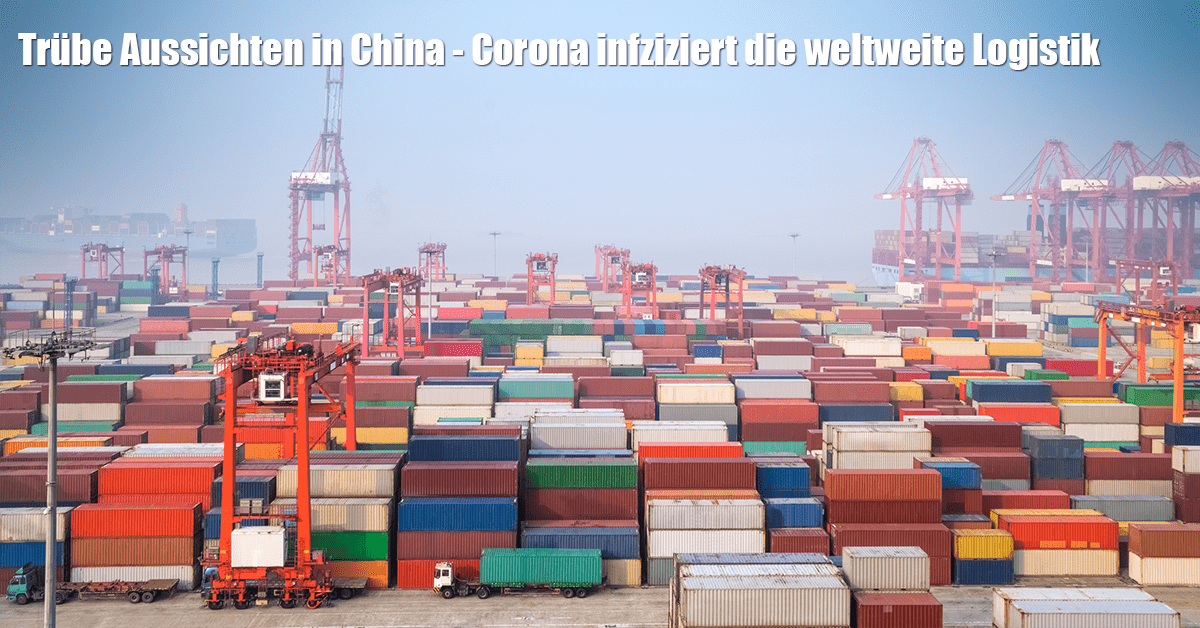China is the so-called workbench of the world. All the goods on which we depend in Europe are imported from the Far East. Incidents such as the development of the coronavirus naturally also immediately affect the export and import movements of goods, which can change permanently due to the large number of exports. In this article you will find out how you can best react to impending logistics difficulties.
Until now it was hardly imaginable on this scale, but due to the coronavirus it has become a bitter reality: China's entire goods turnover is literally at a standstill. The largest freight containers in the logistics chain are stacked up at the container ports, and aerial photos show scenes like those from a child's room, in which many colorful rectangular stones are spread out. The capacity limits are slowly being reached and the harbor masters no longer know where to stack the goods. Sensitive goods such as frozen pork, beef and poultry are particularly annoying. The main consequences: Not only are the drivers of the transport companies no longer allowed to drive due to the highly contagious pandemic, but above all there is a lack of power connections to cool the fresh products. A failure with dizzying costs. Extremely problematic for the Chinese population: Since African swine fever has unnecessarily broken out in addition to the coronavirus, the country is therefore extremely dependent on meat imports. Because of swine fever, hundreds of thousands of domestically bred animals had to be killed.
Almost all sea freight transport routes are affected
The main focus is on sea transport to and from China - due to their connection to all global networks, the decline in transport automatically affects Europe and the rest of Asia. At the moment it doesn't look as if this situation will suddenly improve, as an incredibly large backlog has now formed, which will now have to be cleared as soon as everyone is allowed to go to work again. Even if the most urgent goods can be transported by air freight, these are also limited due to the lack of belly capacity (cargo space used in passenger aircraft).
Russia is drawing its first hard borders
In order to at least partially counteract the spread of the coronavirus, Russia has already imposed an official entry ban for Chinese nationals. While this is a very stark move, it is at least a temporary response to the news from Asia. The main problem for both sides: Russia has always had strong economic ties to China; the two countries are considered each other's largest trading partners. With a trade turnover of 110 billion US dollars, the two nations set an absolute record last year. In the first weeks of 2020, Russian exports to China fell by a full third.
The economic risk for Germany should not be underestimated
The standstill in China is already having serious consequences for the German economy. Especially when companies are tied to exports from China, frightening disillusionment quickly sets in: you can literally feel that it will be a while before Chinese production is back up to full steam. Companies that rely almost exclusively on supplier products from China are now even more bitter. This domino effect is felt across half the globe. According to calculations by the German Institute for Economic Research (Ifo), the coronavirus outbreak in China has the overall potential to significantly weaken the entire economic growth in Germany.
Solutions and ways
The South China Morning Post ( https://www.scmp.com/ ) currently announces that the number of new infections has fallen significantly. Nevertheless, the situation remains so tense that it is difficult to predict when and to what extent China's export economy will fully recover. So you and we only have one option at the moment - to stay in touch in order to monitor the current situation together and develop individual solutions.
As your trusted logistics provider, we will provide you with the latest information from the affected regions at all times. Please contact us if you have specific questions about the coronavirus.






